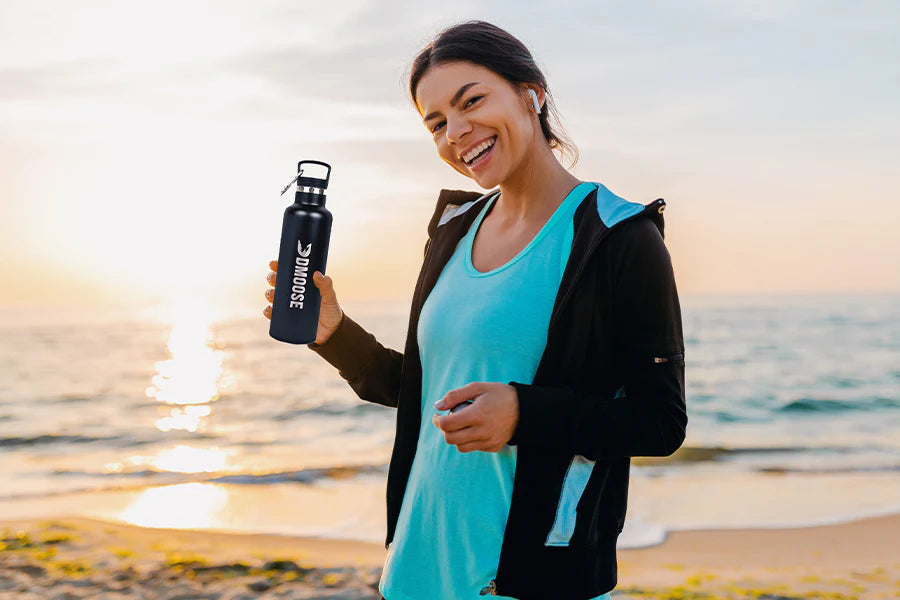Protein is an essential macronutrient required by the human body for various functions. It is the building block of muscles, skin, bones, and blood. Protein is also necessary for enzymes and hormones and plays a role in metabolism.
According to the Recommended Dietary Allowance, humans need 0.8 grams of protein per kilogram of body weight daily. The RDA is the daily amount of a nutrient you need to meet your basic nutritional requirements. It's not the amount you're supposed to consume daily but the minimum amount necessary to prevent illness.
Protein needs are higher for athletes and other people who exercise regularly. For example, long-distance runners may need up to 1 gram of protein per kilogram of body. It is recommended that 10-35% of your daily calories come from protein. This article will discuss why the human body needs protein and where it should come from.
What is Protein, and Why Does the Human Body Need It?

Protein is a macronutrient that is essential to the human body. It is comprised of amino acids, the building blocks of all tissues in the body, including muscle. Protein is necessary for the growth and repair of tissues, and it plays a role in many bodily functions, such as enzymes and hormones.
Without enough protein, your muscles will weaken, and you will be at a greater risk for injury. Moreover, protein helps you feel fuller for longer and can help you lose or maintain weight. When you include protein in your diet, you are more likely to eat fewer overall calories.
It provides the body with the required energy and prevents fatigue. Eating protein can help you feel more alert and energetic throughout the day. Protein also plays a crucial role in producing hormones and enzymes. Enzymes are responsible for many processes in the body, such as digestion. Besides that, protein-rich foods can help you avoid unhealthy cravings and make it easier to stick to a healthy diet.
On the other hand, a lack of protein can seriously affect the body. Without enough protein, your body will begin to break down muscle for energy. This can lead to muscle weakness and atrophy (shrinking). Since protein is necessary to repair tissues, protein deficiency can make it difficult for your wounds to heal. In addition, a lack of protein can lead to fatigue and lethargy.
As protein is necessary to produce antibodies, which help fight infection, a lack of protein can make you more susceptible to illness and disease. Furthermore, protein deficiency can cause fluid to build up in the body, leading to swelling (edema) and weight gain. Protein is also necessary for the production of hormones, and a lack of protein can cause hormone imbalances, leading to various health problems.
In short, protein deficiency is a severe problem that can majorly impact the body. So, if you think you may be deficient in protein, speak to a doctor or dietitian.
Related Article: 15 Nutrient-Dense Foods That Will Build Your Body Like No Other
How Much Protein Does Your Body Need?
The recommended dietary allowance (RDA) for protein is 0.36 grams per pound (0.8 grams per kg) of body weight. This amounts to:
- 54 grams of protein per day for a sedentary man
- 46 grams of protein per day for a sedentary woman
- 64 grams of protein per day for an active man
- 48 grams of protein per day for an active woman
Pregnant and breastfeeding women need more protein than the RDA, and athletes and people trying to build muscle mass may also need more.
It is important to note that the RDA is the minimum protein you need to maintain minimum health. Eating more protein than the RDA is not necessarily bad for you, and when consumed in the right amount can boost performance and increase lean muscle mass.
Consuming more protein than your body needs has some side effects. You may experience weight gain if you consume too many calories in general (protein is included in this). Taking protein more than the recommended amount may also cause dehydration, as it can lead to water loss through urination.
Protein is broken down into ammonia and other compounds that can cause bad breath, which could be another side effect of excessive protein intake. Large amounts of protein can be hard to digest, resulting in nausea. Moreover, it can also cause bloating and constipation, as a high-protein diet can be difficult to digest and may lead to intestinal blockages.
If you are concerned about consuming too much protein, speak with a doctor or dietitian to help you determine how much protein you need based on your individual needs.
How to Keep Track of and Measure Your Protein Intake?
There are a few ways to make sure you're getting enough protein:
- Use a Food Tracker: Some many apps and websites can help track your protein intake.
- Read Food Labels: Food labels list the amount of protein in grams. Be sure to pay attention to serving sizes when reading labels.
- Eat Protein At Every Meal: Make sure each meal contains some source of protein, such as meat, fish, eggs, dairy, beans, or nuts.
- Snack on Protein-Rich Foods: If you need a snack, choose something high in protein, such as yogurt, trail mix, or hard-boiled eggs.
- Add Protein Powder to Smoothies or Shakes: Protein powder is a quick and easy way to get more protein. Just be sure to check the label for added sugars and other ingredients.
Related Article: Light & Healthy Protein Pancakes Recipe
Good Sources of Protein

There are many good sources of protein. Animal sources, such as meat, fish, and poultry, contain all the essential amino acids your body needs. Here are some of the best protein sources:
- Chicken is a lean protein that is low in calories and fat. It is also a good source of niacin, phosphorus, and vitamin B6.
- Fish is a good source of omega-3 fatty acids, which are beneficial for heart health. It is also rich in selenium, magnesium, and potassium.
- Eggs are an excellent source of protein and contain all the essential amino acids your body needs. They also contain choline, which is essential to maintain brain health.
- Dairy products, such as milk and yogurt, are healthy protein sources. They also contain calcium, which is important for strong bones.
- Beans are a healthy source of protein, fiber, and iron. They are also low in calories and fat.
Incorporating these foods into your diet can help you meet your protein needs while getting other essential nutrients.
Moreover, protein supplements can be a helpful way to increase your protein intake. However, getting most of your protein from whole foods is best. You must switch to supplements only if you cannot meet your protein requirement through diet.
Protein supplements, such as whey protein, can be beneficial if you are not getting enough protein from your diet. Whey protein is a quick and easy way to increase your protein intake. It is also low in calories and fat.
Whey protein has several other benefits, including increasing muscle mass, reducing hunger, boosting immunity, lowering blood pressure, and improving liver function. Nevertheless, if you are considering taking a protein supplement, speak with a doctor or dietitian first to determine the right supplement for you and get guidance on how to take it safely.
Related Article: A Beginners Guide on Whey Protein and How It Can Help You
FAQs
1. Where in your body is protein needed and why?
Protein is needed in every single cell in your body for many reasons. It helps build and repair tissues, provides the structure for your bones and muscles, aids in the production of enzymes and hormones, and much more. Protein is essential for good health, regardless of age or lifestyle.
Protein plays a crucial role for athletes and people who are always on the go. That's because protein helps repair muscle tissue broken down during exercise. It also provides the energy you need to power through your workouts. If you don't get enough protein, you may not be able to recover from your workouts or reach your fitness goals.
2. How can I increase my protein intake?
There are many ways to increase your protein intake naturally. One way is to make sure you are eating enough high-quality protein foods. Some good protein sources include meat, fish, poultry, eggs, dairy products, legumes, nuts, and seeds.
Another way is to include plenty of plant-based proteins in your diet. Some healthy plant-based protein sources include soy products, quinoa, buckwheat, chia seeds, and hemp seeds.
You can also try a protein supplement if you find it challenging to meet your daily protein needs through food alone. Protein supplements can be a convenient way to get the extra protein you need without having to prepare special meals.
3. What happens if you don't get enough protein?
Protein is essential for the growth and maintenance of nearly all tissues in the body, including muscle. Not getting enough protein can lead to muscle wasting, which can slow wound healing, decrease immune function, and cause brittle bones. A lack of protein can also cause fatigue, dizziness, and lightheadedness.
4. What food is full of protein?
There are a lot of foods that are full of protein! Here are some examples:
- Seafood: Fish, shrimp, and other seafood are excellent protein sources. They're also low in calories and fat, making them a perfect choice for those watching their weight.
- Meat: Chicken, beef, pork, and other types of meat are also high in protein. Choose leaner cuts of meat to reduce the amount of fat you consume.
- Beans and Legumes: Beans, lentils, peanuts, and other legumes are a great source of protein for vegetarians and vegans. They're also high in fiber and nutrients like iron and magnesium.
- Other Plant-Based Protein Source: For those looking for plant-based proteins, nuts and seeds, soy products, quinoa, buckwheat, chia seeds, and hemp seeds are some of the best options.
Final Thoughts
Protein is an essential nutrient required for many body functions, including muscle growth and repair, immunity, and hormone production. Getting enough protein is essential for good health. Most people can meet their protein needs by eating various protein-rich foods. Good protein sources include meat, fish, poultry, eggs, dairy, beans, legumes, and tofu. You may consider taking a protein supplement if you are not getting enough protein from your diet. Before taking a protein supplement, consult a doctor or dietitian to find the right supplement.
Reading List
15 Nutrient-Dense Foods That Will Build Your Body Like No Other
A Beginners Guide on Whey Protein and How It Can Help You
Foods Containing the Nine Essential Amino Acids That Must Be in Your Diet
Top 7 Benefits of Whey Protein Powder
Article Sources
- Gurtner, Geoffrey C., et al. “Wound Repair and Regeneration.” Nature, vol. 453, no. 7193, May 2008, pp. 314–21. www.nature.com, https://doi.org/10.1038/nature07039.
- Jeukendrup, Asker E. “Nutrition for Endurance Sports: Marathon, Triathlon, and Road Cycling.” Food, Nutrition and Sports Performance III, Routledge, 2013.
- Kini, Usha, and B. N. Nandeesh. “Physiology of Bone Formation, Remodeling, and Metabolism.” Radionuclide and Hybrid Bone Imaging, edited by Ignac Fogelman et al., Springer, 2012, pp. 29–57. Springer Link, https://doi.org/10.1007/978-3-642-02400-9_2.
- Kominiarek, Michelle A., and Priya Rajan. “Nutrition Recommendations in Pregnancy and Lactation.” The Medical Clinics of North America, vol. 100, no. 6, Nov. 2016, pp. 1199–215. PubMed Central, https://doi.org/10.1016/j.mcna.2016.06.004.
- Rehrer, Nancy J. “Fluid and Electrolyte Balance in Ultra-Endurance Sport.” Sports Medicine, vol. 31, no. 10, Aug. 2001, pp. 701–15. Springer Link, https://doi.org/10.2165/00007256-200131100-00001.








